PyCon Finland 2025 recap
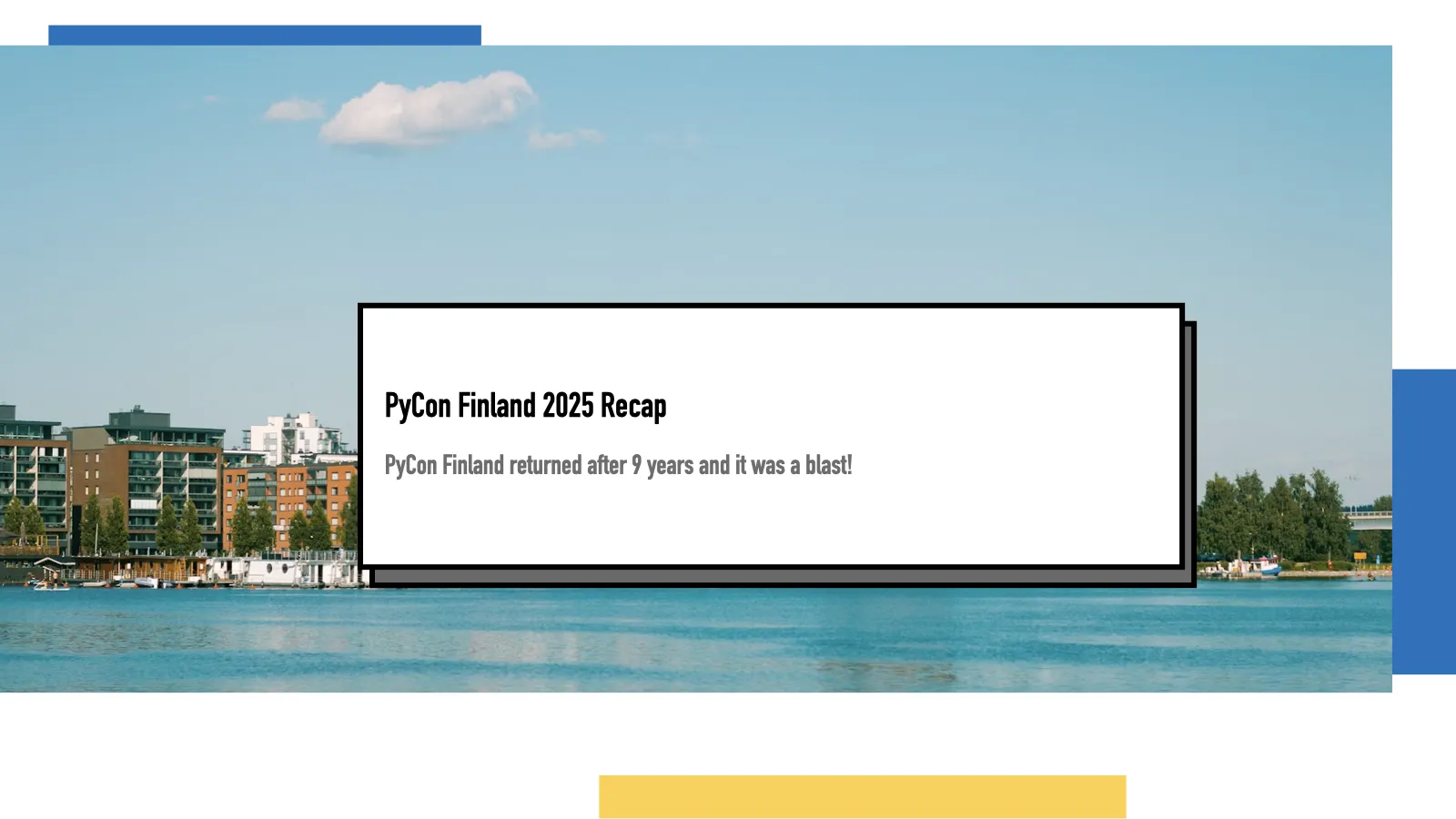
In 2016, I gave my first developer conference talk, Data Scraping for Beginners, as a beginner speaker and met a lot of fantastic people in the conference. It kickstarted my journey as a public speaker and in the 9 years since, I’ve been on different stages sharing my stories hundreds of times.
It was the last PyCon Finland for a long time, until this October when thanks to the great initiative by Plone Conference organisers Rikupekka Oksanen, Asmo Soukka and others who with the support of other local Python communities decided to bring back PyCon Finland and organise it as part of this year’s Plone Conference in Jyväskylä.
I proposed my talk Debugging Python which was accepted in the Friday morning block.
chapter 0 where I talk about conferences
When you’re sending your people, your teams to conferences, you’re not just buying them some “knowledge”. No, you’re investing in something much more valuable. You’re helping them come back as more inspired, more connected, more curious, and more engaged members of the community. And yes, that’s something that can’t be measured or reported back, I’m afraid. But here’s the thing: you might notice that spark in their eyes when they come back to office and start talking about that new component they can’t wait to design and build.
Matthias Ott wrote this less than a week before PyCon Finland and I felt it deep in my bones. It’s such a great way to describe why attending conferences is such an impactful move.
I’ve shared more good insights from others in Chance of serendipity that I highly recommend reading if you’re not quite sure why people attend events like these.
I probably didn’t learn something specific that I could bring to my job next week and immediately implement. I did get a lot of inspiration, new ideas and enthusiasm that I can definitely bring to the office.
chapter 1 where we travel to Jyväskylä
From Turku, we arrived with a two-person delegate, representing our local Python community archipylago. Me and Tero took the train to Jyväskylä Thursday afternoon and spent most of the travel time by playing one of my favourite two player board games Lost Cities that I got to teach Tero.

I almost always travel alone and while I do enjoy it, having a friend to travel with makes the trips fly by like it did this time as well. And with Tero we always end up into such good discussions given enough time so every time we learn something new and get new ideas.
After a train trip from Turku through Tampere to Jyväskylä came to its end, we checked in to the hotel, ate dinner in the hotel restaurant (the food was incredible!). I had a burger with thick patty, delicious Jukola cheese, paprika-tomato-chutney and crispy fries and it was one of the best I’ve had in a long time.

As PyCon Finland was part of Plone Conference that had been already going for a couple of days, there was a party in the evening that we joined. Usually, when I got to conferences around Europe, I know quite a lot of people (and there’s quite a few people who know me) so it was a really weird social experience to be in the conference where I knew only a couple of people and where everyone else already knew each other through the Plone community and the week’s earlier conference days.
We didn’t stay quite as long as some of the party goers (I remember seeing some photos in Discord from around 4.30) but went back to the hotel where I did final adjustments to my slides and enjoyed a good night sleep.
chapter 2 where I speak at the conference
The hardest part of doing a conference talk is waking up early enough to not miss it. This time I managed to get up, eat breakfast at the hotel and walked across the parking lot to the venue at University of Jyväskylä’s Agora building.
Since I had an early morning speaking slot, I went directly to do a tech check and missed the lightning talk signups. I didn’t then have a change to make people laugh with my version number comparison lightning talk.
My talk was the last talk of the morning slot. As I was waiting for my moment, I listened as Alexander Loechel introduced eduTAP, a mobile app and ecosystem aimed for universities in Europe and around the world to provide authentication of student status, access to different services and even payments. I also got to learn about Guillotina Volto from Nil Bacardit and Roger Boixader Güell but as I was nervously preparing for my own talk to start and haven’t used Plone or its frontend system Volto before, I didn’t follow too intensively.

The third slot was mine. The room filled up with developers eager to see my rubber ducks and learn a trick or two about debugging. I’ve performed the talk a couple of times in the past so I was confident in my content and timing. At one point, I noticed I hadn’t been breathing quite enough and started to feel the consequences but managed to pull myself back and I don’t think anyone in the audience even noticed.
I was very satisfied with my talk. Last conference I did it was in PyCon Sweden 2023 and back then I felt it was my best conference talk and this one was neck and neck with it. The hall and audience was bigger in Sweden and I tend to perform better the bigger the audience is but on this one, I had a better opportunity to read audience’s faces which made it a lovely experience.
If you're interested in the talk, I have it written in blog format at Debugging Python.
The feedback I received from the talk was so good and made my week. If you ever see a talk in an event that you enjoyed, tell the speaker that! It feels good to get positive feedback.
One of my favourite things while doing talks like these is seeing people’s faces light up when they learn something new or when they smile or laugh at the right moments. That’s when I know I’ve succeeded in doing what I came to do.
And the best part of these is meeting new people, learning from them and having great discussions and there was no shortage of those discussions in this conference. Whether it was the discussions right after the talk, during the hallway track at the venue or while grabbing a beer after the event, I cherish all of them and want to thank everyone who came to chat. ❤️
I didn’t have to go through my talk alone. I had my support group of Frank, Uni and Cado:

I finally remembered to bring my ducks to my debugging talk! And of course, Cado who is my conference talk support animal was with me the whole way. (Cado is no stranger to PyCon stages.)
chapter 3 where I get to relax and learn from others
Even after hundreds of times on the stage and high confidence in my talk, the butterflies find their way to my stomach a bit before the talk. Once the talk starts, they go their own way and after the talk, I get to relax, continue discussions and enjoy others’ talks.
A sign of the quality of the conference was that pretty much before every talk slot, we had the discussion of “oh, I’d like to see them all” and had to choose only one.
Here’s a short recap of the talks I particularly enjoyed. Maurits van Rees also wrote notes from the talks he watched so if you’re interested in some of the other talks, I recommend checking his blog out.
Patrik Lauha: Muuttolintujen Kevät - Automatic Bird Sound Classifier

After my talk, we had the keynote of the day where Patrik Lauha talked about a fascinating project. They trained a model to recognise birds by their singing and built a mobile app where people all around Finland can record birds as they sing and learn which birds they are.
What was especially interesting was how they transformed audio into images and then did image recognition to identify birds. I hadn’t even thought of such possibility and apparently it helps a lot in simplifying the data and doing comparisons.
Robert Silén: Building RAG AI Applications with MariaDB Vector and Python

After the lunch, Robert Silén from MariaDB Foundation talked about vector databases and how to augment AI models with custom data to create custom chatbots from which to ask questions about your data.
I’m not much of an LLM fan and haven’t done much in this space so my focus was a bit off during the talk.
An interlude about making friends in a conference
In Shy introvert's (short) guide to speaking in conferences I wrote:
The time leading up to your talk is nervous and many people like to stay away from people to practice. What I like to do is spend my conference day making friends. Before the talks, during breakfast, during breaks and lunch, I try to find people to talk with. Especially great if I can find groups with some people I made friends with before the event that I can ease my way into the discussion through someone I know.
and
Both of these lead towards one goal: instead of speaking to strangers, by the time my talk starts, I'm talking to friends. And speaking to friends is so much easier than to strangers.
I met next talk’s speaker Fodil during the lunch break as he joined our table and we had a lovely discussion about (human) languages, living abroad, experiencing different cultures and what not.
This block had so many interesting talks but when I heard Fodil was the one speaking about Shiny, a tool to create interactive dashboards, that I was familiar with from R world but hadn’t used with Python, it was an easy decision to join his talk.
He asked me to take some photos of him talking — the same thing I asked Tero to do for my talk — and I was happy to help out. This is one of the tips I recommend everyone to do if you’re speaking in a conference. If you don’t already have a friend who’s gonna attend your talk, make friends with someone and ask them to take some photos. It can suck to give a talk and leave the conference only to realise you have no photos to remember the talk from or share with friends.one who does talks to do: if you don’t already have friends in the conference who will at
Mohamed El Fodil Ihaddaden: Shiny for Python: Reactive Web Apps Made Simple

So I listened to Fodil who showed us what Shiny can do, how to avoid certain pitfalls with long-running data fetching and a few tips for how to use it with Python to use different types of data and interactions.
Talks that showcase tools through demos that are available in GitHub are cool ones in conferences because you can go and try them out yourself and tinker, and continue from them.
Katrin Zaks: Accessibility‑First Development: A New Core Company Value
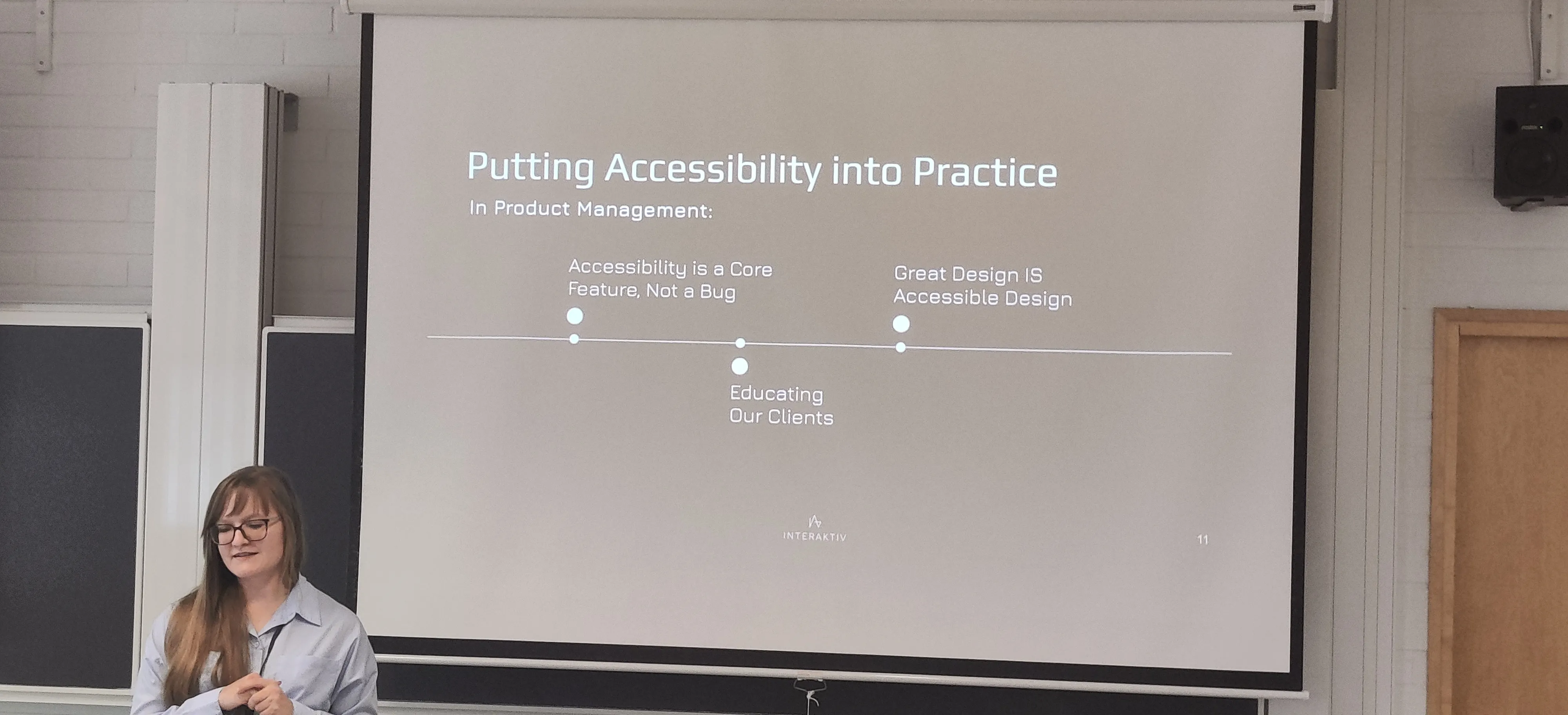
I love seeing talks about accessibility in tech conferences so while there were other interesting talks for this slot, the choice was rather easy. Katrin talked about accessibility-first development where accessibility is not considered as a necessary evil that’s added at the end but rather a fundamental part of building software for everyone.
Her talk was excellent and I liked how it focused mostly on why accessibility matters and how to adapt company’s approach to it.
Tatu Aalto: Why as Developer I Am Blind to Bugs
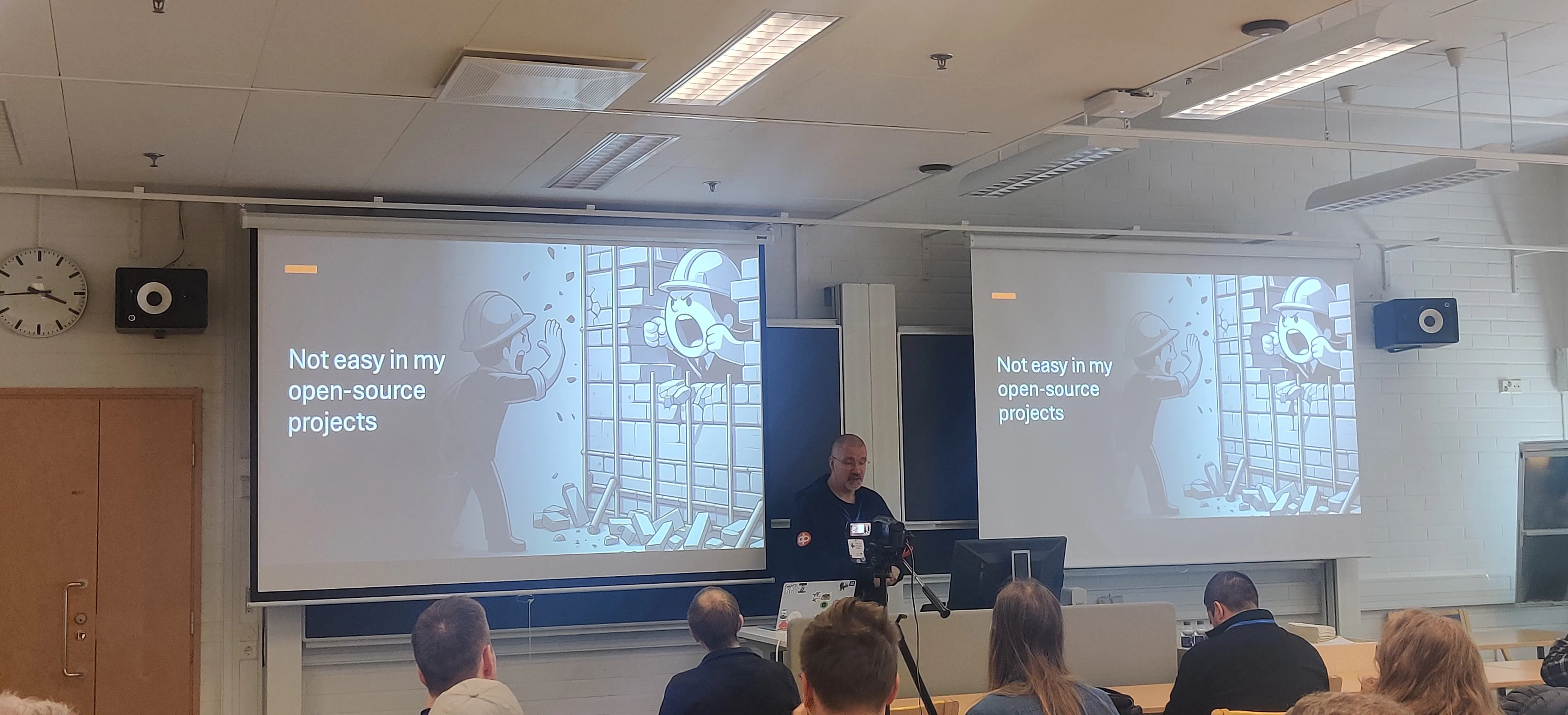
We had two talks about bugs in the conference! And they were completely different. I got to meet Tatu after my talk and he strengthened my debugging duck crew with a teeny-tiny duck which I’ll put in special spot at home so I don’t lose it.
In his own talk in the afternoon, Tatu talked about his journey from testing to software development and to building test automation tools and how he understood that there are (at least) two roles (developer and tester) inside him that need to work together to build quality software.
Lightning talks
I love lightning talks. They are this unique part of conferences where you can talk about anything you want for 5 minutes and are often filled with variety of topics, a lot of fun and light-hearted content and announcements for projects and events. This time wasn’t any difference.
We started with a brilliant presentation about the history of casserole in Finnish cuisine from 1800s to today. What a great way to start the lightning talks. I don’t enjoy eating casserole but I loved learning about their history.
There were also a bunch of announcements and proposals for different Plone events, including the next Plone Conference in Maastricht next year.
One that touched me personally was a talk about how it’s okay to feel good about the things you do and build and talk about them. Especially in the community space, I try to make sure the spotlight isn’t on me and my motivations because as the face of the activities I often get too much credit that’s more deserved by others who make the community what it is and I don’t want my ego to get too much into the driving seat.
chapter 4 where I say thanks
and go home
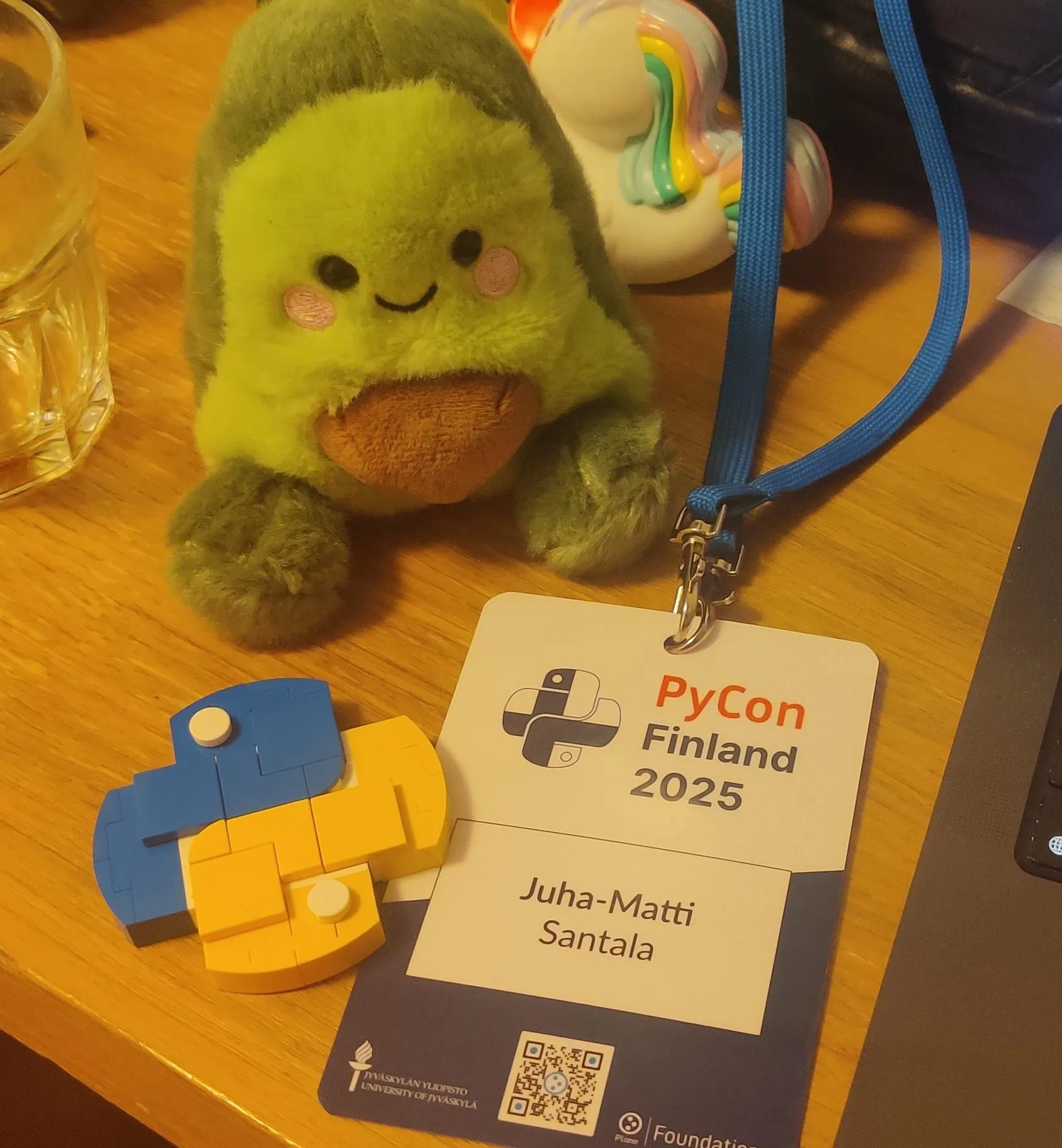
PyCon Finland was an absolutely lovely experience.
Big thanks to all the organisers, speakers and friends — old and new.
The local grassroots Python community situation in Finland looks very different than it did a couple of years ago and I hope that we can together make PyCon Finland a reality in 2026 as well.
I got so much new ideas and inspiration that I’ve been missing for a while now.
If you, my dear reader, have a PyCon in your country or somewhere close by, I highly recommend joining when it happens next time. I have been to many across Europe and I have always come home better than when I left home. Never a bad one because the community of Pythonistas is just lovely.
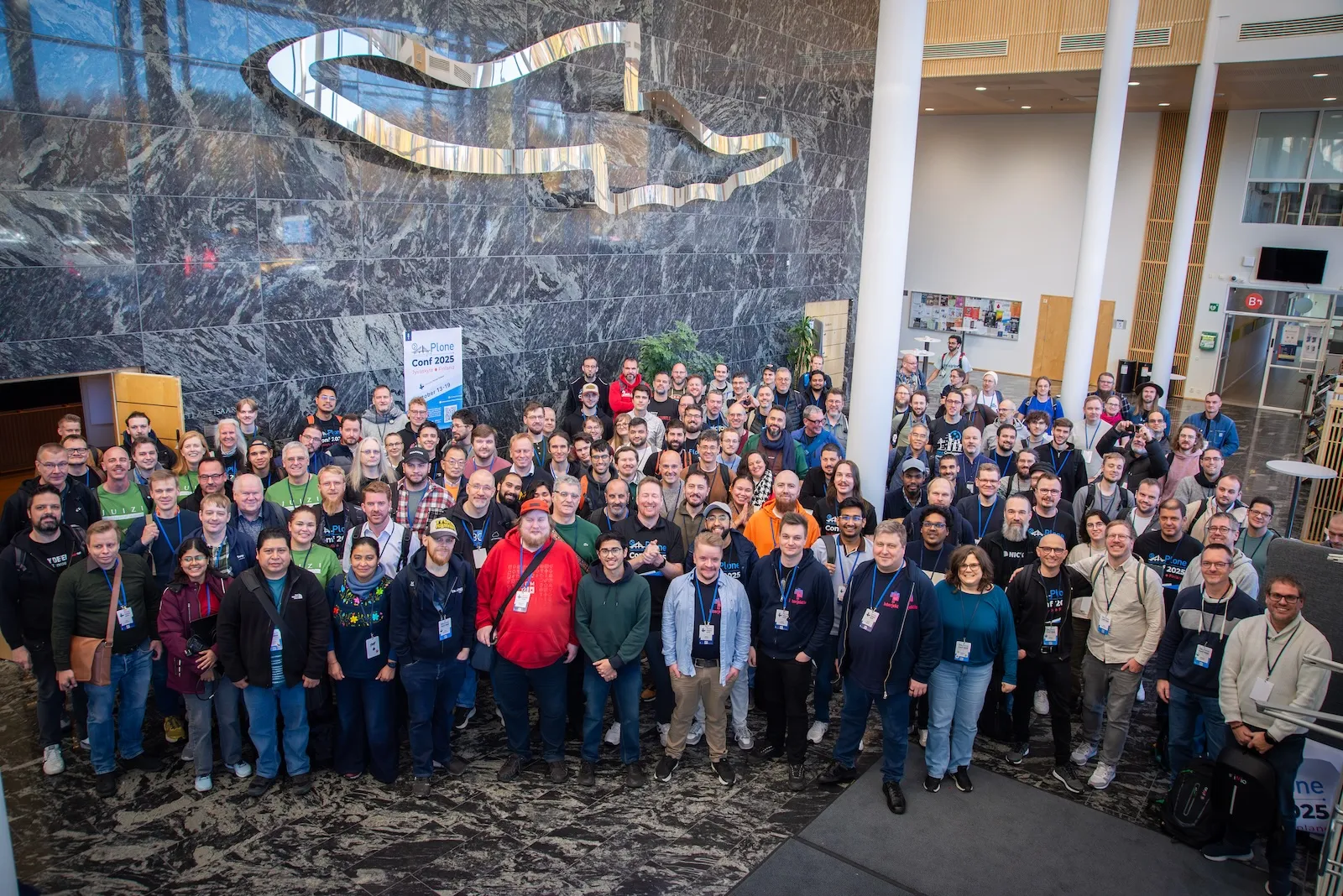
chapter 5 where instead of going home, I went to Lokacon
A few days before the conference I learned that on Saturday, Jyväskylän Science Fiction Seura 42 were organising Lokacon, a science fiction and literary event at the library. Since I had booked a hotel for the night after the conference, I decided to book my train trip to the afternoon and joined the event.
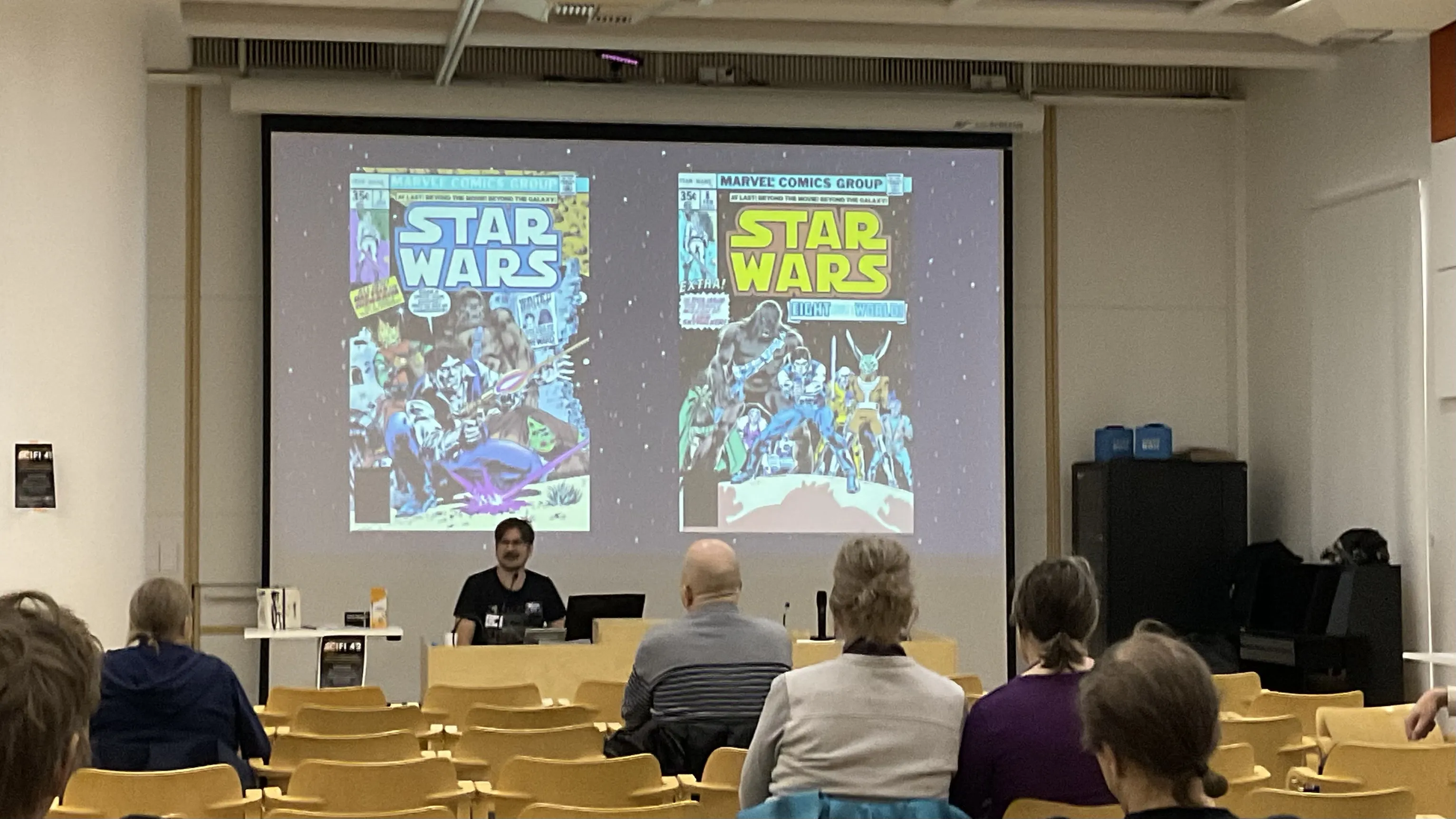
I had time to listen to two talks and they were both excellent. Juha Hautala took us to a journey through time and talked about the history of Star Wars comics from the late 1970s to today. There were a lot of familiar comics for me but also a bunch of interesting ones that I hadn’t heard of so I have some backlog to catch up.
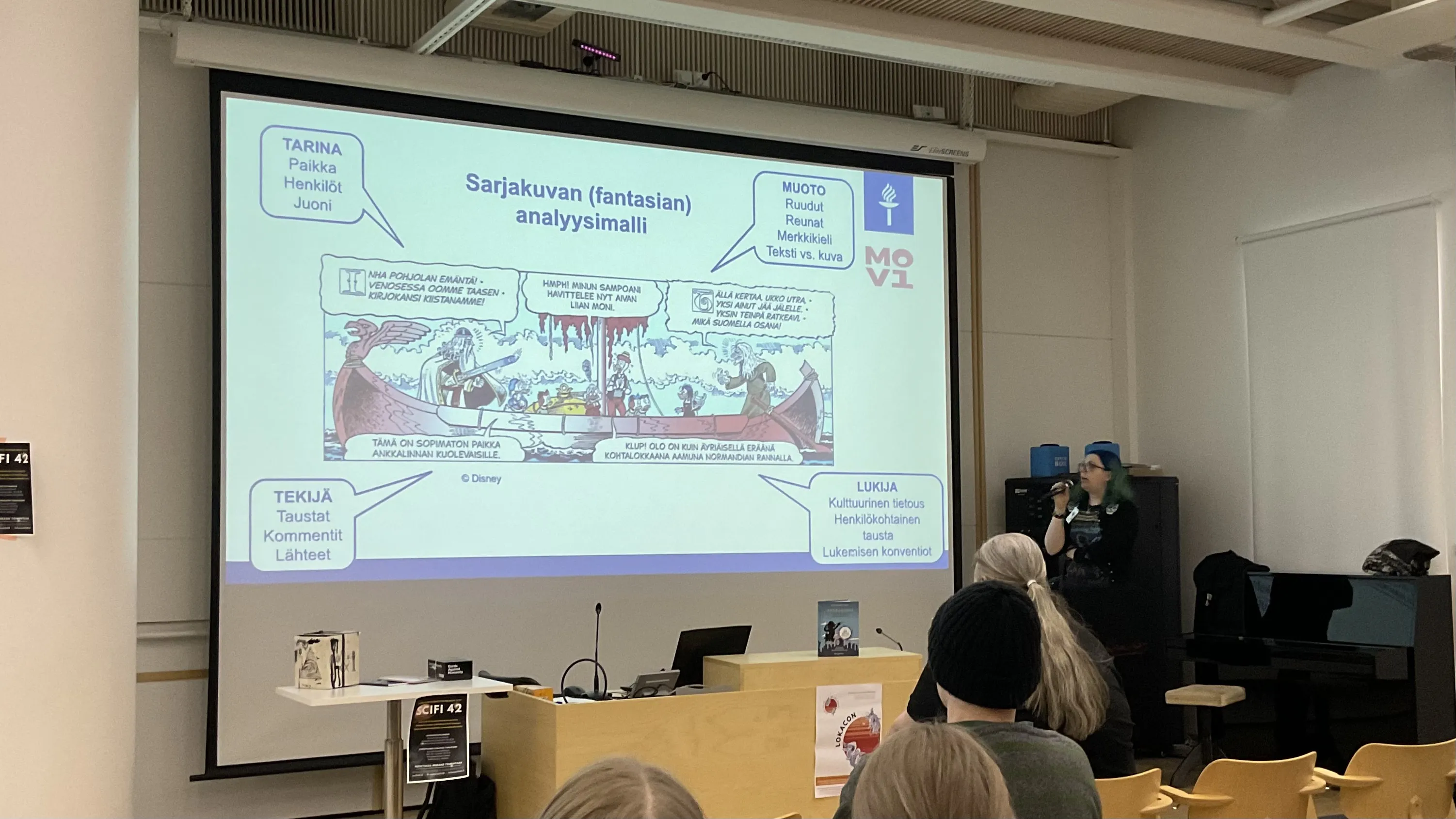
Ankkatohtori (lit. Duck Dr.) Katja Kontturi who wrote her doctoral thesis on Don Rosa’s comics talked about her journey from a fan of the comics to a doctor of them and what she discovered. I also bought her book that’s based on her thesis: Ankkalinna, portti kahden maailman välillä (eng. Duckburg, portal between two worlds) and got a dedication from her on the book as well.
Going home is always the sad part of conferences because it means going back to day-to-day. One of the reasons I became a professional community builder was that I hated doing that so much that I didn’t want to go that route and instead, I got to continue in the events space and with communities even when it was time to go home.
Hopefully one day I’ll get back to that world.
Until then, our archipylago and Turku ❤️ Frontend meetups continue so if you’re in the are around Turku and want to feel the same magic, see you there!
If something above resonated with you, let's start a discussion about it! Email me at juhamattisantala at gmail dot com and share your thoughts. This year, I want to have more deeper discussions with people from around the world and I'd love if you'd be part of that.